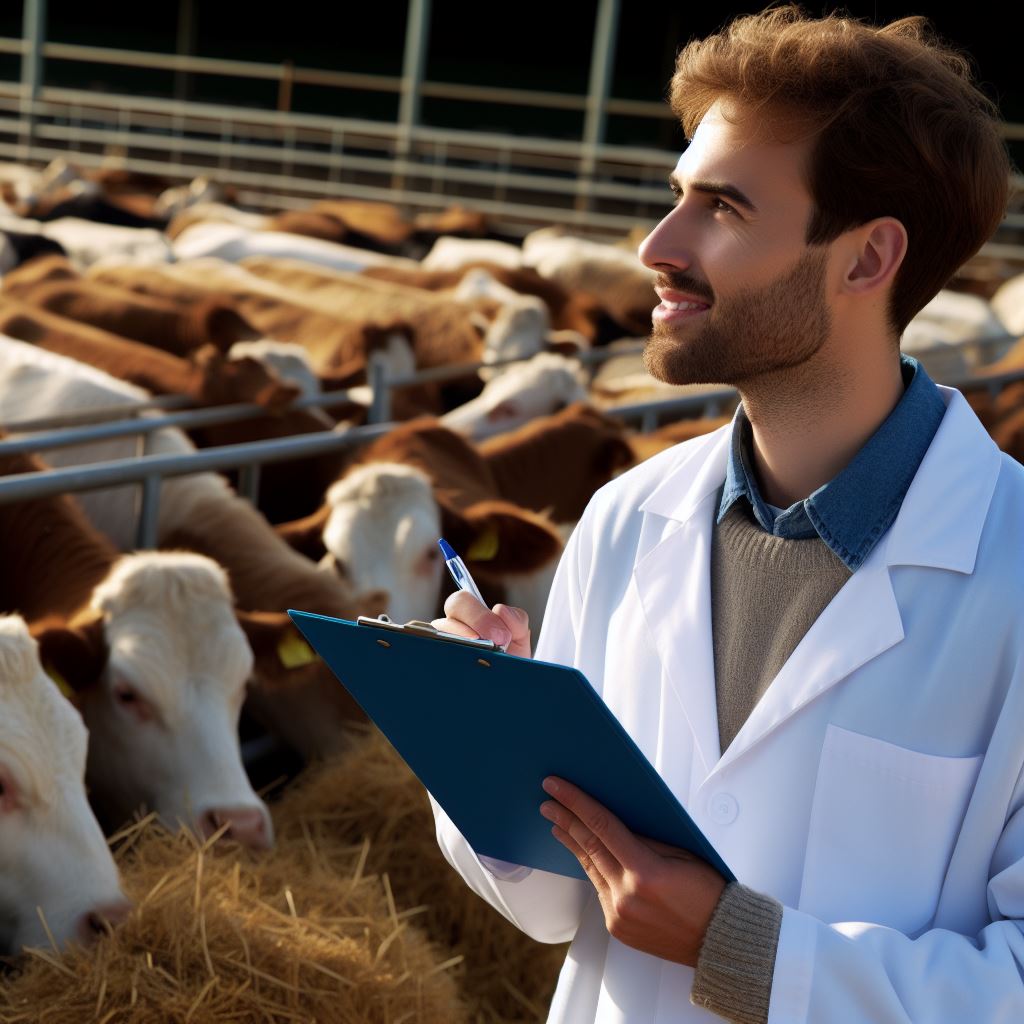Introduction
In Australia’s agricultural landscape, the significance of agricultural scientists resonates profoundly, as they stand at the forefront of driving innovation and sustainability in the sector.
These scientists play a pivotal role in advancing agricultural practices, ensuring food security, and mitigating environmental challenges through their research and expertise.
Agri scientists are instrumental in shaping the trajectory of Australia’s agricultural industry.
Through their pioneering research and innovative solutions, they address critical issues such as crop yield optimization, soil health management, pest and disease control, and sustainable farming practices.
Their contributions not only enhance agricultural productivity but also foster resilience in the face of climate variability and other environmental factors.
Moreover, agri scientists play a crucial role in fostering collaboration between industry stakeholders, government agencies, and research institutions, driving collective efforts towards achieving a more sustainable and prosperous agricultural sector.
The purpose of this blog post is to delve into the multifaceted role of agricultural scientists in Australia and to provide insights into their contributions, challenges, and opportunities within the agricultural landscape.
By exploring the diverse facets of their profession, we aim to shed light on the invaluable work of agri scientists and to foster a deeper understanding of their impact on Australia’s agricultural sector.
Additionally, we seek to inspire aspiring agricultural scientists and stakeholders to recognize the vital role they play in ensuring the future sustainability and prosperity of Australia’s agricultural industry.
Join us on this enlightening journey as we uncover the untold stories and remarkable achievements of Australia’s agri scientists.
What is an agri scientist?
An agri scientist is a professional who specializes in agricultural sciences and research.
The role of an agri scientist involves conducting scientific experiments and studies to improve agricultural practices
- An agri scientist is responsible for developing innovative farming techniques and technologies.
- They analyze soil, water, and crop samples to determine the best fertilizers and methods for optimal plant growth.
- Agri scientists also study the impact of pests, diseases, and climate change on crops and devise strategies to mitigate these risks.
Agri scientists play a crucial role in driving advancements in the agricultural industry
- Their expertise and research contribute to increasing crop yields and improving food quality.
- Agri scientists help farmers adopt sustainable farming practices to protect the environment and ensure long-term food security.
- They collaborate with policymakers and agricultural organizations to develop policies and regulations that promote efficient and safe farming methods.
Factors Influencing agri scientist salaries
- Education and qualifications: Higher degrees and specialized knowledge may lead to higher salaries.
- Experience: Agri scientists with more experience often command higher salaries.
- Location: Salaries can vary based on the region, as the cost of living and demand for agri scientists differ.
- Industry sector: Agri scientists working in research institutions or government organizations may have different salary scales compared to those in private companies.
Salary ranges and potential career progression for agri scientists in Australia
- The average salary for an agri scientist in Australia is around AUD 79,000 per year.
- Entry-level positions may earn around AUD 55,000, while senior-level positions can reach up to AUD 110,000 or more.
- Career progression opportunities exist in roles such as research managers, consultants, or academics.
Job outlook and demand for agri scientists
- The demand for agri scientists in Australia is expected to remain strong.
- The growing global population, climate change challenges, and the need for sustainable agriculture contribute to this demand.
- Job opportunities exist in various sectors, including research institutions, government agencies, agricultural companies, and consulting firms.
Agri scientists play a vital role in advancing agriculture, ensuring food security, and promoting sustainable farming practices.
Their responsibilities encompass conducting research, developing innovative techniques, and collaborating with stakeholders to improve the agricultural industry.
In Australia, agri scientist salaries vary based on factors like education, experience, location, and industry sector.
The job outlook for agri scientists is promising, with a continuous demand for their expertise in addressing agricultural challenges.
Pursuing a career as an agri scientist can be both fulfilling and financially rewarding in the Australian agricultural industry.
Read: The Economics of Farming in Australia Unveiled
Education and qualifications
Educational requirements to become an agri scientist in Australia
To become an agricultural scientist in Australia, individuals must meet certain educational requirements. These requirements ensure that they possess the necessary knowledge and skills to excel in the field. The educational path typically includes:
- Completion of a bachelor’s degree: Prospective agri scientists must first earn a bachelor’s degree in agricultural science or a related discipline. This undergraduate program provides a strong foundation in various aspects of agriculture, such as crop science, animal science, soil science, and agricultural economics. It usually takes around three to four years to complete.
- Specialization in a specific area: During their bachelor’s degree, students may have the opportunity to specialize in a particular area of agricultural science, such as plant breeding, food technology, or livestock management. Specializations allow individuals to develop expertise in their chosen field and enhance their job prospects.
- Practical experience: Many agricultural science programs in Australia require students to gain practical experience through internships, fieldwork, or research projects. These hands-on opportunities provide valuable exposure to real-world agricultural practices and help students apply theoretical knowledge to practical scenarios.
Specific degrees or courses relevant to the field
Several degrees and courses are relevant to the field of agricultural science in Australia. These programs provide specialized knowledge and skills required for various roles within the industry. Some specific degrees and courses include:
- Bachelor of Agricultural Science: This degree focuses on providing a comprehensive understanding of agricultural science principles, practices, and technologies.
- Bachelor of Agribusiness: This degree combines agricultural science with business and economics, preparing individuals for management roles within the agricultural sector.
- Master of Agricultural Science: This postgraduate degree allows individuals to further specialize in areas such as plant pathology, agronomy, or agricultural economics.
- Diploma in Horticulture: This course specifically focuses on horticulture practices, including plant propagation, crop production, and landscape design.
- Certificate IV in Agriculture: This course provides practical knowledge and skills required for entry-level positions in the agricultural industry, such as farmhand or station hand.
Additional certifications or licenses
In addition to formal education, there may be certain certifications or licenses that agri scientists in Australia may need to obtain.
These certifications ensure professionals meet specific industry standards and regulations. Some important certifications and licenses include:
- Chemical Users Certification: This certification is required for individuals who handle or use agricultural chemicals, such as pesticides or herbicides. It ensures they have proper training in chemical safety and handling.
- Machinery Operation License: Some roles within the agricultural sector may require individuals to operate specialized machinery, such as tractors or harvesters. Obtaining a machinery operation license demonstrates competency in handling agricultural machinery safely.
- Working with Animals Certification: Agri scientists involved in livestock management or veterinary science may need to obtain a certification demonstrating their competence in working with animals. This certification ensures the humane treatment and welfare of animals.
To sum up, becoming an agri scientist in Australia requires completing a bachelor’s degree in agricultural science, specializing in a specific area, gaining practical experience, and obtaining relevant certifications or licenses.
Pursuing specific degrees or courses such as agricultural science, agribusiness, or horticulture can provide individuals with the necessary knowledge and skills to excel in this field.
Additionally, acquiring certifications related to chemical handling, machinery operation, or working with animals can further enhance career opportunities in agricultural science.
Read: Exploring Permaculture Practices in Australia
Your Personalized Career Strategy
Unlock your potential with tailored career consulting. Get clear, actionable steps designed for your success. Start now!
Get StartedJob prospects and demand
Overview of the current demand for agri scientists in Australia
- There is a significant demand for agri scientists in Australia.
- The agricultural industry heavily relies on the expertise of agri scientists.
- Agri scientists play a crucial role in improving farm productivity, sustainability, and environmental protection.
- They contribute to the development of new technologies and advancements in agricultural practices.
- The demand for agri scientists is expected to grow steadily in the coming years.
Factors contributing to the growing demand
- The increasing population and changing dietary habits necessitate the need for increased agricultural production.
- Technological advancements require skilled professionals to implement and adapt them to the agricultural sector.
- The focus on sustainability and environmental protection demands innovative solutions, which agri scientists can provide.
- Emerging challenges such as climate change and water scarcity require agri scientists’ expertise to find solutions.
- Government policies and investments in the agricultural sector also contribute to the growing demand for agri scientists.
Challenges and opportunities in the job market
- The job market for agri scientists offers both challenges and opportunities.
- Challenges include intense competition for positions, especially in high-demand specializations.
- Agri scientists may face difficulties in finding suitable job positions in remote locations.
- However, opportunities exist for those with relevant qualifications, skills, and a willingness to adapt to emerging trends.
- International collaboration and research opportunities are also available for agri scientists.
- The job market for agri scientists is diverse, with roles in research, academia, industry, and government.
- Agri scientists can work in various subfields, such as crop production, animal science, soil management, and food science.
- There is also potential for career progression and specialization within the field of agri science.
In essence, the demand for agri scientists in Australia is significant and expected to grow in the coming years. Factors such as increasing population, technological advancements, and environmental concerns contribute to this demand.
While the job market poses challenges, there are also opportunities for those with the right qualifications and skills.
Agri scientists play a crucial role in improving agricultural practices, productivity, and sustainability, making their expertise highly valued in the industry.
Read: Soil Health and Its Importance in Aussie Farms

Average salaries and salary range
Present statistics on the average salaries of agri scientists in Australia
Australia offers competitive salaries to agricultural scientists, reflecting the importance of their role in the industry. According to recent statistics, the average salary of agri scientists in Australia is around AUD 82,000 per year.
Breakdown the salary range based on years of experience and specialization
The salary range for agri scientists varies depending on their level of experience and specialization. Entry-level agri scientists typically earn around AUD 60,000 per year, while those with more than ten years of experience can earn up to AUD 120,000 per year.
Agri scientists specializing in fields such as crop production, livestock management, and agricultural engineering can expect higher salaries compared to their counterparts in general agricultural roles.
Compare the salaries to other related professions in the agricultural industry
When comparing agri scientist salaries to other related professions in the agricultural industry, it becomes clear that they are reasonably competitive.
For example, agricultural technicians, who work closely with agri scientists, have a lower average salary range of around AUD 50,000 to AUD 75,000 per year. This could be attributed to the difference in educational requirements and specialization levels.
On the other hand, agricultural consultants, who provide expert advice to farmers and agricultural businesses, earn similar salaries to agri scientists. The average salary range for agricultural consultants in Australia is around AUD 80,000 to AUD 100,000 per year.
However, it is important to note that agri scientists typically spend several years studying and specializing in their field, which contributes to their higher earning potential.
Their knowledge and expertise in scientific research and analysis justify the higher salaries they receive.
In comparison to other industries, such as finance or technology, the salaries of agri scientists may appear modest.
However, it is crucial to consider the context of the agricultural industry, where salaries are influenced by factors such as government funding, market demand for certain skills, and the unique challenges faced by the sector.
Overall, agri scientists in Australia enjoy decent average salaries and a wide salary range based on their experience and specialization.
The demand for their expertise continues to grow, making it an attractive career choice for individuals passionate about agriculture and scientific research.
Read: Australian Cattle Farming: Methods and Myths
List of factors influencing agri-scientist salaries
The salary of agri scientists in Australia can be influenced by various factors, including economic conditions, industry demand, government policies, skills and expertise, location, industry, organization size, experience, and qualifications.
Key factors that impact the salary of agri scientists in Australia
- Economic factors— state of the agricultural industry and overall economy significantly affect salaries.
- Industry demand—the demand for agri scientists in specific sectors can influence salary levels.
- Government policies—policies related to agriculture and research funding can impact salaries.
- Skills and expertise—the specific skills and expertise possessed by agri scientists can affect their earning potential.
Firstly, economic factors play a crucial role in determining agri scientist salaries.
The state of the agricultural industry and the overall economy significantly impact the salaries offered to agri scientists.
During periods of economic downturn, salaries might be lower due to reduced funding and budget constraints.
Conversely, in times of economic growth, salaries might increase as organizations have more resources available.
Secondly, the industry in which agri scientists work can affect their salary levels.
Certain sectors, such as biotechnology or sustainable farming, may offer higher salaries due to the demand for specialized skills and the potential for groundbreaking research.
Agri scientists in these industries may have access to greater funding and resources, leading to higher salaries.
Stand Out with a Resume That Gets Results
Your career is worth more than a generic template. Let us craft a resume and cover letter that showcase your unique strengths and help you secure that dream job.
Get HiredInfluence of location, industry, and organization size on salaries
- Location—salaries can vary based on the cost of living and demand for agri scientists in different regions.
- Industry—certain industries, such as biotechnology or sustainable farming, may offer higher salaries for agri scientists.
- Organization size—larger organizations often have more resources to offer higher salaries compared to smaller ones.
Furthermore, the size and location of the organization also play a crucial role in determining salaries. Salaries can vary based on the cost of living and the demand for agri scientists in different regions.
For example, agri scientists working in rural areas might earn less compared to those in urban areas due to a lower demand for their skills. Additionally, the size of the organization can also impact salaries.
Larger organizations often have more resources available, allowing them to offer higher salaries compared to smaller organizations.
How experience and qualifications can contribute to a higher salary
- Experience—agri scientists with several years of experience often command higher salaries due to their expertise.
- Specialized qualifications—advanced degrees or certifications in specific areas can lead to higher salaries.
- Research track record—a strong track record of publications and successful research projects can increase earning potential.
Additionally, experience and qualifications are vital factors that contribute to higher salaries for agri scientists.
Those with several years of experience in the field often command higher salaries due to their expertise and the value they bring to organizations.
Agri scientists with specialized qualifications, such as advanced degrees or certifications in specific areas, are also likely to earn higher salaries.
Lastly, a track record of successful research projects and publications can significantly impact an agri scientist’s earning potential.
A strong research track record demonstrates the scientist’s capabilities and enhances their value to potential employers, leading to higher salaries and better job opportunities.
In fact, various factors influence agri scientist salaries in Australia.
Economic conditions, industry demand, government policies, skills and expertise, location, organization size, experience, qualifications, and research track record all play a role in determining salary levels.
Understanding these factors is essential for aspiring agri scientists to make informed decisions about their careers and negotiate appropriate salaries.
Read: Climate Change Impact on Australian Farms
Benefits and Opportunities for Career Growth
Agricultural scientists in Australia enjoy various benefits and opportunities for career growth. These include:
Benefits and Perks
- Competitive salaries that reflect the importance of their work and expertise.
- Access to funding and grants for research projects, allowing them to pursue innovative studies.
- Opportunities to work with cutting-edge technologies and equipment in modern agricultural laboratories.
- Flexible work hours that provide a better work-life balance, enabling scientists to pursue personal interests.
- Generous annual leave and vacation time to recharge and relax.
- Medical and health insurance coverage, ensuring they receive necessary healthcare services.
- Paid parental leave and support for working parents.
- Opportunities to collaborate and network with experts in the field, both nationally and internationally.
- Access to professional development opportunities such as conferences, workshops, and training programs.
- Job security and stability within the agricultural sector.
Agricultural scientists receive these benefits as recognition of their invaluable contributions to the industry.
Career Advancement and Growth
The field of agricultural science offers numerous opportunities for career advancement and growth.
- Progression from entry-level positions to senior roles with higher responsibilities and leadership opportunities.
- Specialization in specific areas of agricultural science, such as plant pathology or animal genetics.
- Opportunities for promotion to managerial positions, overseeing research teams and projects.
- Ability to move into academic positions, conducting research and teaching at universities and research institutions.
- Possibility of becoming consultants or advisors to government agencies, private companies, or international organizations.
- Option to start their own agricultural businesses or research ventures, becoming entrepreneurs in the field.
With experience and continuous learning, agri scientists can navigate a successful and fulfilling career path.
Additional Benefits in the Agricultural Sector
Aside from the general benefits, there are some unique advantages that agricultural scientists may enjoy:
- Opportunities to work closely with nature, contributing to sustainable and eco-friendly practices.
- Exposure to diverse research areas, from crop yield improvement to livestock management.
- The chance to make a positive impact on food production, addressing global challenges such as hunger and food security.
- Engagement with local communities, farmers, and stakeholders to develop practical solutions for agricultural issues.
- Opportunities to travel to rural areas and international locations for fieldwork and collaborative projects.
These additional benefits make agricultural science a rewarding career choice that goes beyond monetary rewards.
In review, agri scientists in Australia enjoy a range of benefits and opportunities for career growth. The sector recognizes their contributions by offering competitive salaries, funding for research, and access to modern technologies.
Career advancement opportunities include progression to senior roles, specialization, and possibilities in academia or entrepreneurship.
Moreover, the agricultural sector provides unique benefits, including nature-focused work, making a positive impact on food production, and engaging with local communities.
Considering all these factors, it’s evident that the field of agricultural science offers an attractive and fulfilling career path for aspiring scientists.
Gain More Insights: Australian Fishing Communities: A Closer Look
Conclusion
Throughout this blog post, we’ve navigated the intricate landscape of medical technology, recognizing its pivotal role in revolutionizing healthcare delivery.
We’ve underscored the significance of understanding medical tech salaries in Australia as a reflection of the economic recognition bestowed upon these indispensable professionals.
We’ve delved into the importance of medical technology in enhancing patient care, emphasizing its transformative impact on diagnostics and treatment modalities.
Furthermore, we’ve elucidated the purpose of this post – to unravel the complexities of medical tech salaries in Australia, shedding light on the economic landscape within the healthcare industry.
As we conclude, we extend an earnest invitation to our readers to contemplate a career as an agri scientist in Australia.
With its rich agricultural heritage and burgeoning opportunities in agri-tech innovation, Australia presents an exciting landscape for individuals passionate about agricultural science.
Embracing a career as an agri scientist not only offers the chance to contribute to food security and sustainability but also promises a rewarding journey of discovery and impact.
For those intrigued by the prospects of a career as an agri scientist, we provide additional resources and links for further information.
These resources offer valuable insights into educational pathways, job opportunities, and industry trends, equipping aspiring agri scientists with the knowledge and tools needed to embark on a fulfilling career journey.
In closing, as we bid farewell to this exploration, we encourage readers to embark on their own journeys of discovery in the dynamic fields of medical technology and agricultural science.
Together, let us continue to innovate, inspire, and shape the future of healthcare and agriculture in Australia and beyond.




